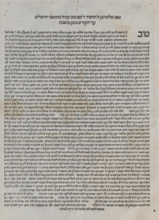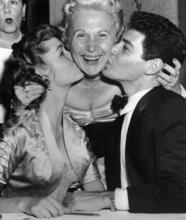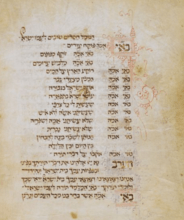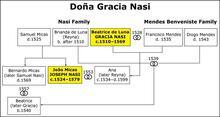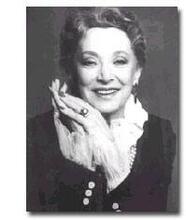Tillie Leblang
Tillie LeBlang was known as a businesswoman, philanthropist, and mother. With her husband and daughters, LeBlang created a multi–million–dollar box office that transformed the way Broadway shows sold tickets. The LeBlangs started out by turning a cigar store into a full–time box office, helping even unpopular shows stay afloat by selling discount tickets. The couple also bought five theaters. When Tillie’s husband, Joseph, died in 1931, she took over the business and expanded it, producing two plays herself in 1932: Tell the Truth and The DuBarry. LeBlang also served as founding president of Ivriah, the women’s division of the Jewish Educational Alliance; director of the Children’s Welfare League, and director of the Blue Bird Camp for Children.
Article
Tillie LeBlang was known as a businesswoman, philanthropist, and mother. When her husband, Joseph, died in 1931, she took control of a family business valued at $12 million to $15 million. During their thirty years of marriage, the LeBlangs built a small retail cigar shop into a cultural empire that operated three ticket agencies and controlled five theaters, three in New York City and two in Newark, New Jersey. LeBlang worked with her husband while raising three daughters. She continued to manage the business until just a few months before she died, with the help of her second husband, William Jasie, who had been the LeBlangs’ business lawyer.
Tillie LeBlang was born in New York on April 25, 1881, to Ignatz and Adele Richter. One of nine children, she attended public school and married Joseph LeBlang in 1900 when she was nineteen. While operating a cigar store at the corner of Sixth Avenue and 30th Street in Manhattan, Joseph LeBlang would allow a press agent to display posters in the window of his store. In return, the agent gave Joseph free tickets to theatrical productions. Joseph would sell these tickets in his store.
Eventually, he persuaded some theater managers to allow him to sell unsold tickets at a discount. For many years, theatrical producers used the phrase “Let’s go see Joe” to help them stay alive during unpopular shows. To keep such productions running, the LeBlangs established ticket agencies that took full responsibility for the sale of all seats. The tickets were sold at a discount, in the hope that the show would eventually become popular.
Tillie LeBlang became as well known in the theatrical world as her husband. After Joseph’s death, she guided the ticket and theater businesses through the Depression years and during the wartime boom. She also became a producer of plays, most notably Tell Her the Truth and The DuBarry, both staged in 1932. When she became ill in 1944, she kept the business in the family by transferring it to her three daughters from her first marriage, Etta Samilson, Dorothy Mark, and Adele Greenbaum.
LeBlang also led several Jewish philanthropic organizations in the New York area. She was a founder and first president of Ivriah, the women’s division of the Jewish Educational Alliance, a director of the Children’s Welfare League, a branch of the Jewish Settlement House of the East Side, and a director of Blue Bird Camp for children. Tillie LeBlang served in the American Red Cross during World War I and supported charities connected with the theatrical profession, including the Stage Relief Association. She was also a member of the League of New York Theaters. She died on March 1, 1945, in a house not far from where she was raised.
Obituary. NYTimes, March 2, 1945, 19.
WWIAJ 3 (1938).

